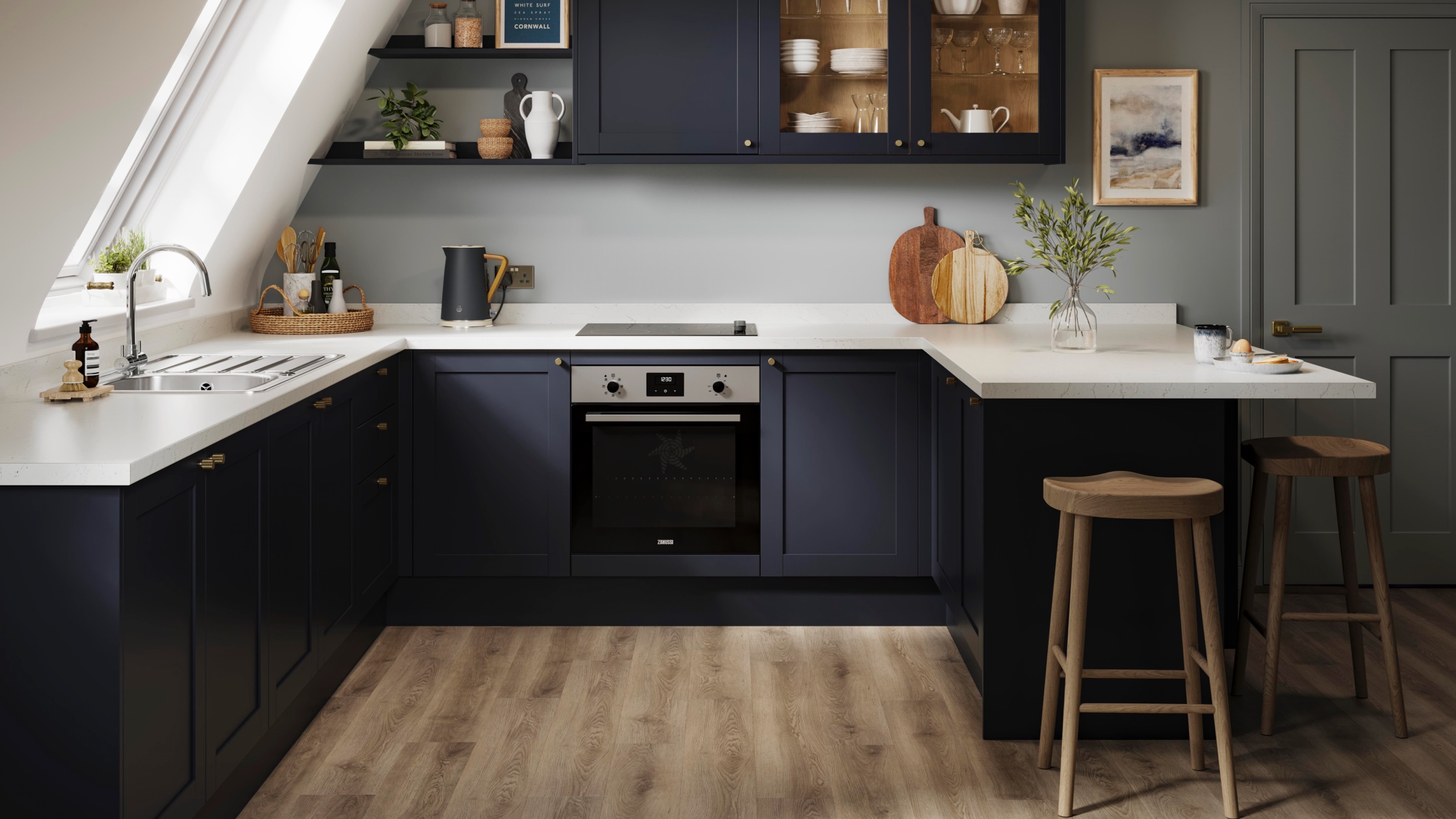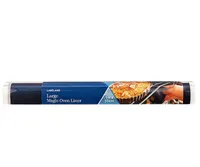How often should an oven be cleaned? Experts have their say
It's a job you should never put off – but the good news is that a little maintenance goes a long way


Sign up to our newsletter for style inspiration, real homes, project and garden advice and shopping know-how
You are now subscribed
Your newsletter sign-up was successful
When was the last time you gave your oven a good scrub? Whether it was yesterday, last week, or you're invoking your right to remain silent on this one, knowing how often should an oven be cleaned can be an important time and money saver.
After spending hours slaving over a hot stove to produce a tasty meal, it's all too easy to close the oven door and forget about the mess you've left behind inside. But knowing how to clean an oven – and doing so regularly – isn't just about aesthetics. it's a crucial step in ensuring the longevity and efficiency of your appliance.
We spoke to several oven-cleaning experts on this, ahem, burning topic – and here's what they had to say...
How often should an oven be cleaned?
How often your oven should be cleaned will depend on a variety of factors – from what you cook and how often, to the size of your household and any self-cleaning features your oven might possess.
Typically, an oven belonging to a family of four, who cook a roast once a week and bake the occasional cake, should be deep cleaned every two to three months.
'For ovens, the regularity of cleaning depends on the level of use and what you’re cooking,' says Sophie Lane, product training manager at Miele. 'If you do a lot of roasting or cooking fatty foods you may need to clean more regularly.'
'If you're a very occasional cook or baker, a deep clean every three to six months should do the trick,' adds Lucy Baxter, Group Marketing Manager at Bosch. 'But if you're a regular in the kitchen, aim for every month or two.'
Sign up to our newsletter for style inspiration, real homes, project and garden advice and shopping know-how

You should also keep on top of things by giving your oven a quick spot clean on a daily-to-weekly basis. This will avoid a build-up of grease and staining that will become more difficult to remove with subsequent use of the oven. You can learn how to clean an oven quickly in 30 minutes, but this will only work if you're keeping on top of regular spot cleans.
'Removing baked-on food and grease is the most difficult part of an oven clean, so wiping out debris regularly with a damp cloth soaked in soapy water is a great way to make the job easier for yourself,' says Housekeep's Liam Dickerson. 'Just make sure the oven is completely cool before you attempt to clean it.'
Sara San Angelo, professional housekeeper and founder of Confessions of a Cleaning Lady, recommends doing this weekly, 'focusing on spills and bits of food left in the oven'. 'For hobs, we would recommend wiping them down after each use,' adds Lucy Baxter.
Why is important to clean an oven regularly?
As grease and grime builds up, it can affect an oven's ability to reach the right temperature, and provide even cooking conditions. This will lead to poor cooking results and will increase the cost of running an oven.
In a recent oven cleaning warning, Mike Harris, founder of Oven Rescue Group, estimated that: 'A dirty oven can add up to 10% more to an energy bill than a clean oven.' What's more, the increased strain on your oven can cause your its fan and elements to fail.
In the meantime, your dirty oven will be burning away leftover food deposits, releasing harmful gases such as sulphur dioxide, nitrogen oxide, and carbon monoxide into your kitchen. These noxious gases can taint the taste of your food, cause your eyes to sting and exacerbate breathing conditions like asthma.
How often should an oven be cleaned professionally?
The consensus among oven cleaning professionals is that most people will have their oven cleaned once a year. However, this can vary depending on the size of your household, how often you actually use your oven and what you cook in it.
'It's common, if people have inherited a range cooker with their new home, that they will have the whole thing fully cleaned when they first move in,' says Karen Davis, co-founder and director of The Oven Cleaning Co. 'They'll then regularly just get the main oven cavity cleaned. We generally advise six months between cleans.
'Someone living on their own, not doing much cooking may only need it done once a year. A family of six that cooks every night and does a roast every weekend may be looking to have it done every three to four months,' she adds.
'If people are preparing a Sunday lunch with a fatty joint every week, we're going to see them once a year,' says Rik Hellewell, managing director at Ovenu. 'We're a firm believer in doing it properly so that people don't have to pay to have it done more regularly.
'Smaller households or those that use the oven more for baking, which isn't as messy, may only come to us every couple of years. Many of our clients basically come to us when they can't see through the glass!'

How often should I use my oven's pyrolytic function?
A pyrolytic cleaning function can make light work of oven cleaning. If your oven has this technology, all you'll need to do is remove any trays and racks, then activate pyrolytic mode. This raises the inside temperature to 500°C, turning the grease and grime inside to ash that can be swept out afterwards.
'If you have an oven with a pyrolytic self-cleaning programme, you can afford to go a bit longer between doing a full clean,' says Sophie Lane, product training manager for Miele. 'The heat of this programme will remove pretty much anything from the inner cavity without the need for elbow grease.'
'Miele pyrolytic ovens have three settings to choose depending on how dirty your oven is. 1 is for light soiling to be used approximately once a month. 2 is for medium soiling for use every two-to-three months, and 3 is for heavy soiling, to be used every four-to-six months. For the average household, a pyrolytic programme once every couple of months should be sufficient.'
Top tip: This writer's friend was lucky enough to inherit an oven with a pyrolytic mode in a house move. Although it was only when I visited her house and pointed it out that she realised, so it's worth checking. If you don't have the original manual, you should find the serial number of your oven near the inside door, often on the frame. Armed with this, you can download the instructions from the manufacturer's website.

How do I know when it's time to clean my oven?
This should be a matter of common sense, but these are the tell-tale signs that your oven needs cleaning as a matter of urgency:
- Your oven is giving off fumes or smoke.
- The controls are sticky or hard to turn.
- You can't see your food through the door glass.
- Carbonised food and spills are visible on the oven floor.
- Food cooked in the oven tastes smoky or tainted.
- You can't remember the last time you cleaned it.

How to make your oven easier to clean
Lynsey Crombie, AKA Lynsey Queen of Clean, likes to use an oven liner to protect the floor of her oven.
'It catches all the grease and grime, and just makes it so much easier when you do come to clean your oven,' she says. 'It's also super, super easy to clean. You just need to take it to the sink, give it a soak in some warm soapy water – I add a a bit of white vinegar if it's got quite a lot of grease on it. Then leave it to dry on the draining board, or if it's a nice day, hang it outside.'
Lynsey is a fan of Lakeland oven liner. This can be cut to size to fit your oven perfectly.
Magic Non-Stick Oven Liner | £22.99 at Lakeland
This 100 x 45cm sheet liner can be cut to size and will last up to five years. It can be easily cleaned in the dishwasher, or using Lynsey's technique.
There's just one word of warning if you plan to use liners. 'Floor liners do help, but they are harmful to your oven if you have a floor element,' says Karen at The Oven Cleaning Co. 'If you have any heating element in the base of your oven, and you add one of these oven liners, you can break your element. This is because the liner will reflect the heat back down, whereas the purpose of the element is to circulate heat around the oven.' So always check your manufacturer's instructions before fitting one.
In conclusion, cleaning your oven as regularly as you can possibly manage is the key. 'The best thing for your oven is to clean it little and often,' says Miele's Sophie Lane. 'If your oven does not have a pyrolytic cleaning cycle, try as best as you can to clean frequently. The longer you leave it, stains get baked on and can become extremely difficult to remove.' Right, time to reach for the rubber gloves and get scrubbing!

Amy Cutmore is an experienced interiors editor and writer, who has worked on titles including Ideal Home, Homes & Gardens, LivingEtc, Real Homes, GardeningEtc, Top Ten Reviews and Country Life. And she's a winner of the PPA's Digital Content Leader of the Year. A homes journalist for two decades, she has a strong background in technology and appliances, and has a small portfolio of rental properties, so can offer advice to renters and rentees, alike.
